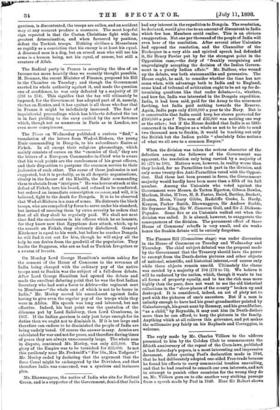On Monday Lord George Hamilton's motion asking for the consent
of the House of Commons to the revenues of India being charged with the ordinary pay of the native troops sent to Suakin was the subject of a full-dress debate. After Lord George Hamilton had opened the debate and made the excellent debating point that he was the first Indian Secretary who had sent a force to Africa—the regiment sent to Mombasa—" the whole cost of which is not to be borne in India," Mr. Morley moved his amendment against India having to give even the regular pay of the troops while they were in Africa. His speech was long and laboured, but not effective. Indeed, his best point was the quotation of the dilemma put by Lord Salisbury, then Lord Cranborne, in 1867. if the Indian garrison is only just large enough for its duties then we ought not to diminish it. If it is too large and therefore can endure to be diminished the people of India are being unduly taxed. Of course the answer is easy. Armies are calculated for war and not for peace, and therefore during times of peace they are always unnecessarily large. The whole sum in dispute, continued Mr. Morley, was only £35,000. The glory of the Empire was to be tarnished for £35,000. Is not this perilously near Mr. Peck sniff's " For 18s., Mrs. Tod gers ?" Mr. Morley ended by declaring that the argument that the Suez Canal might be endangered by the Dervishes, and that therefore India was concerned, was a spurious and insincere plea.


































 Previous page
Previous page